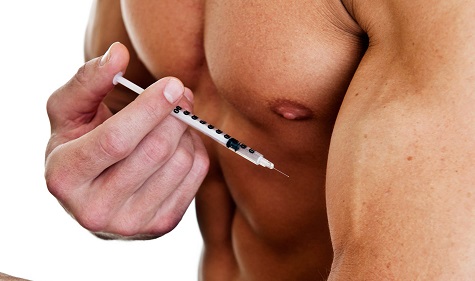Male Breast Cancer - Body Builders Apr 02, 2023 2 years, 1 week, 4 days, 7 hours, 27 minutes ago
Unknown to many known, breast cancer can also occur in men as males too have breast tissue and are at risk of developing breast cancer.
 Pic Credit: John Sommer / Getty
Pic Credit: John Sommer / Getty
As a result of the fallacy that breast cancer is primarily a “woman’s disease,” many men tend to ignore symptoms, often resulting in later-stage diagnoses and potentially worse outcomes.
Although overall survival for
male breast cancer patients has improved over time, the prognosis for men with the disease hasn’t advanced as much as it has for women.
Men need to not only know that they can and do get breast cancer but also that they must be proactive about reporting any lumps, inflammation, or otherwise unusual changes to their doctors.
Male Breast Cancer Statistics And Rising Incidence.
In just the United States alone, more than 2,800 men are diagnosed with breast cancer each year and approximately 530 men die from the disease, according to the
American Cancer Society.
About one in 833 men globally will develop breast cancer in their lifetime. Although that statistic may not sound as daunting as the equivalent for women ie one in eight will be diagnosed in their lifetime, the fact that male breast cancer is so rare makes it uniquely challenging.
https://www.cancer.org/cancer/breast-cancer-in-men/about/key-statistics.html
https://www.ncbi.nlm.nih.gov/pmc/articles/PMC9155932/
https://www.ncbi.nlm.nih.gov/pmc/articles/PMC7476060/
Over the last 10 years, the incidence of male breast cancer increased from 7.2% to 10.3%, and the trend shows that it is still increasing.
https://www.ncbi.nlm.nih.gov/pmc/articles/PMC7476060/
Differences and Similarities Between Breast Cancer In Man And Women
Human breasts in both sexes have nipples, fatty tissue, breast cells and ducts. Men and women also share some of the same risk factors for breast cancer. Both sexes may have a family history of breast cancer or BRCA1 and BRCA2 mutations that may increase cancer risk. Obesity is another common risk factor for both sexes, and the human body, regardless of gender, produces the hormone estrogen, which at certain levels may increase breast cancer risk.
Importantly, the incidence of breast cancer in men is far less than in women, in part because, although the breast tissue in both is similar, men have mainly fat and fibrous breast tissue called stroma, and they have fewer ducts and lobules.
Wh
en women’s breasts mature during puberty, they develop working lobules and milk ducts to produce and carry milk after childbirth. Most breast cancers in women develop in these ducts and lobules.
Inherited gene mutations may also increase cancer risk in both sexes, but they’re likely to affect men and women differently. While BRCA mutations significantly increase a man’s risk of breast cancer, men with these mutations are at a higher risk of prostate cancer than breast or other cancers.
Women generally produce more estrogen than men, potentially further increasing cancer risk. One reason for its rarity in men may be related to their lower estrogen levels.
Bodybuilders At Higher Risk Of Developing Male Breast Cancer
Many bodybuilders and athletes often take anabolic steroids to maximize muscle growth, which can lead to gynecomastia due to subsequent hormonal imbalances.
Gynecomastia is a condition of overdevelopment or enlargement of the breast tissue in men or boys. The breasts become larger.
Studies have shown that gynecomastia in men often lead to male breast cancer.
https://www.ncbi.nlm.nih.gov/pmc/articles/PMC2276281/
https://www.cancer.gov/news-events/press-releases/2014/breastcancermalepoolingstudy
https://bmccancer.biomedcentral.com/articles/10.1186/1471-2407-2-26
https://pubmed.ncbi.nlm.nih.gov/21472195/
The Challenges Of Male Breast Cancer Diagnosis
One of the biggest challenges in early detection of breast cancer in males are:
-Most Men usually are not taught to screen themselves for breast cancer.
-Many males are unaware of the symptoms of the disease.
-Males who develop symptoms of breast cancer may choose to ignore them because of perceived stigmas and fear of emasculation.
-Men usually are diagnosed with breast cancer at an older age and with the cancer at a more advanced stage, for these and other reasons, often leading to poorer outcomes.
It has been found that men may have poorer outcomes than women due to being diagnosed at more advanced stages and at an older age.
Symptoms Of Male Breast Cancer:
The symptoms of breast cancer in men are like those in women, including:
-A lump or thickening in or near the breast
-Changes in the size or shape of the breast
-Dimple or puckering on the breast skin
-Nipple turned inward
-Nipple discharge
-Changes to the appearance of the areola or breast skin, including scaly or read patches or skin that resembles an orange peel
Interestingly, according to doctors, because men’s breast usually are smaller and have less tissue than women’s breasts, men may be better able to feel a lump or structural changes to the breast.
Men with symptoms may undergo a mammogram, a low-dose X-ray designed to detect spots, lumps or abnormalities in the breast tissue. Men may also undergo an ultrasound, MRI or biopsy to help confirm a diagnosis and determine whether the diseased has advanced to metastatic breast cancer, in which cancer cells have spread to lymph nodes or distant parts of the body.
Male Breast Cancer Treatments Options
As with women, male breast cancer treatment may include:
-Mastectomy, surgical removal of the breast
-Radiation therapy
-Chemotherapy
-Hormone therapy
-Targeted therapy
-Immunotherapy
Other Interesting Facts About Male Breast Cancer
-About 80 percent of male breast cancers are hormone-receptor positive.
-Infiltrating or invasive ductal carcinoma is the most common type of breast cancer in men.
-Other breast cancers diagnosed in men include:
Ductal carcinoma in situ
Inflammatory breast cancer
Paget disease of the nipple
-Klinefelter syndrome, a condition in which men are born with two X chromosomes, may produce excessive estrogen and increased risk of breast cancer.
In the UK, there was increased awareness of Male Breast Cancer after media reports of a prominent male body builder developing breast cancer became viral in the local news.
https://www.dailymail.co.uk/health/article-2532558/Bodybuilding-father-four-diagnosed-BREAST-cancer-finding-lump-working-gym.html
https://www.walesonline.co.uk/news/wales-news/male-bodybuilders-shocking-tale-i-6379115
For the latest on
Male Breast Cancer, keep on logging to Thailand Medical News.
